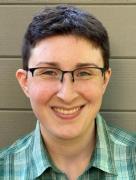The Episcopal Church Executive Council in June approved seven United Thank Offering (UTO) Young Adult and Seminarian grants, two of which were awarded to recipients in the Diocese of Massachusetts, according to a June 17 media release.
The UTO awards grants to support innovative mission and ministry throughout the Episcopal Church and provinces of the Anglican Communion. The focus of this year’s Young Adult and Seminarian grants was “Holy Gifts: bringing together our blessings and gifts to breathe love, liberation and life into our communities.”
* * *
A $5,000 Young Adult Award was granted to Rowan Larson, the minister for Christian formation at Grace Church in Newton, to create a website that includes a digital picture book, as well as accompanying parent and resource guides about gender identity and expression.
In a phone interview, Larson explained how this project was inspired by their work as a children’s formation minister, and the lack of resources available for children around religion and gender identity and expression.
“When you’re talking to a five-year-old about [gender identity and expression] you want to make sure that you’re saying the right thing,” Larson said. “There are some secular resources about gender for young children but there aren’t really religious resources. There needs to be this resource and I feel that, as a formation minister and someone who is nonbinary and identifies as trans, there needs to be something, and I am as qualified as anyone to write it.”
Larson plans to create an online picture book that will allow children to scroll through and read it on a computer or tablet, accompanied by guides for parents, family or formation ministers who are seeking resources to talk about gender identity and expression with young children. Though Larson is launching the project as an online resource in order to get it out there as soon as possible for people to use, Larson hopes that in the future they might be able to publish a physical copy of the children’s book as well.
The $5,000 grant will fund the time for the creation of the resources and the cost of story illustrations, as well as website hosting. Larson explained that they will be working with an illustrator who is not white and having important conversations around race to make sure there is a lot of representation for children to see in the book.
“I’ve had some conversations with parents of transgender children, especially that very small Venn diagram intersection of clergy with transgender children, and those have been really fruitful conversations,” Larson said. “But I’m also planning to make sure that I talk to people like the diversity officer of the Episcopal Church and others to make sure that, as a white, nonbinary, trans person, I’m still writing in a way that’s going to be inclusive for [children of color] as well and that they’ll be able to see themselves.”
Citing their 15-year background as a childcare provider, Larson noted how the many children’s books they had seen over the years often featured animals or inanimate objects as main characters and, in the ones that did have human main characters, there were proportionately very few of those characters who were people of color.
“I know how important that is for children to see characters that look like them and in this case, there will be more gender-variant children,” Larson said. “That’s what my goal is with the project, and I pray that I will be able to have the right words and to do justice to this.
“I hope that it can help just one kid realize--even if they’re not sure how they feel about their body, and their gender--that they’re still made in the image of God, that God did not make a mistake, that God loves them and that, when we say, ‘We’re made in the image of God,' the image of God is so much more complicated than we can understand or imagine.”
Larson continued: “Trying to say that you have to be a boy or you have to be a girl or you have to act a certain way to be the way God made you doesn’t really capture the fullness of God.”
* * *
A UTO Seminarian Award of $2,800 was granted to Kevin Neil, who serves as a chaplain to the MANNA community at the Cathedral Church of St. Paul in Boston. MANNA (Many Angels Needed Now and Always) is a ministry of and with the homeless community in downtown Boston, and the money was awarded to fund a MANNA Housing Recovery Group which “seeks to reduce loss of housing amongst those who are newly housed and have experienced chronic homelessness by creating spaces of practical education on housing skills, finding emotional resonance for the struggles and celebrating housing milestones along the way,” according to the June 17 media release.
“I applied for the grant because, for a couple of years now at the MANNA community, there’s been this pretty clear identified need for recovery and residence groups for folks who have been chronically homeless and recently gotten housing,” Neil said in a phone interview. “Once someone gets housing, many of the supports drop off, there’s the assumption of fulfillment and mental stability, and the reality which we’ve heard time and time again is actually the opposite--where people feel completely unsupported, completely dissociated [from] community. There are relapses, often lapses in mental health, so having a group where you can find resonance for that--we think--is really powerful.”
Neil explained that the idea was inspired by recovery groups such as Narcotics Anonymous and Alcoholics Anonymous which provide community support around a struggle, and milestones that are awarded with something tangible like the AA “tokens.” The initial idea was to celebrate achievements in the community--such as six months of housing--and blossomed into a concept of meetings every other week, alternating between group discussion around a common issue or topic, and then practical meetings in which members of the group can share helpful skills or tips with other members of the community.
The group plans to form in the next few months, as the MANNA community continues to adapt to COVID-19 impacts in their community, and the grant money will be used to fund the meetings, including snacks and round-trip T passes to help those who may have housing in a different neighborhood get downtown to the cathedral for the group. It is also hoped that this group can be used as a model to help form similar housing support groups in other neighborhoods of Boston and beyond.
There are intentionally no explicit faith-related aspects to the program so as to keep it accessible to those who may not be affiliated with the Christian faith, but as a chaplain to the community, Neil does see this effort to help a marginalized community as important faith-rooted work.
“At the MANNA community we say that we stand on the side of life and all its fullness, and we think that folks have a right to be able to live safely and wholly in their own homes, and to have their own homes,” Neil said. “Being able to support making that possible in a place where people can thrive is definitely rooted in a faithful place.”
--Bridget K. Wood


